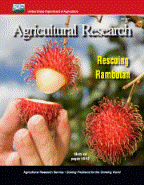United States Department of Agriculture: Agricultural Research Service, Lincoln, Nebraska

Agricultural Research Magazine
Date of this Version
3-2013
Document Type
Article
Citation
Agricultural Research March 2013
Abstract
In some rural villages of the tiny West African nation of The Gambia, food is generally less available during August and September—the peak of the rainy season—than during a typically dry March through May. Now, a study led by molecular geneticist Robert A. Waterland of the USDA-ARS Children’s Nutrition Research Center in Houston, Texas, has shown that functioning of certain genes in kids conceived during the rainy season differs from that in children conceived during the dry season.
The difference may be explained by a relatively new science referred to as “epigenetics.” The variation appears to be permanent, and in the case of two of the five genes in which it was detected, the variation may affect the kids’ risk of certain diseases.
Waterland and coinvestigators have attributed the epigenetic variation to the dramatic seasonal differences in the kinds and amounts of foods available to soonto- be moms in the days and weeks around the time of conception, or what’s referred to as their “periconceptional nutrition.” The results of the study are of interest to healthcare professionals involved in improving the prenatal nutrition of these Gambian women, many of whom are, along with other family members, subsistence farmers living at or below the poverty level.
But Waterland’s study is also of worldwide interest to geneticists, because it presents new, unique evidence of nutritional influences on the development of epigenetic mechanisms in humans.
Included in
Agriculture Commons, Animal Sciences Commons, Food Science Commons, Plant Sciences Commons

